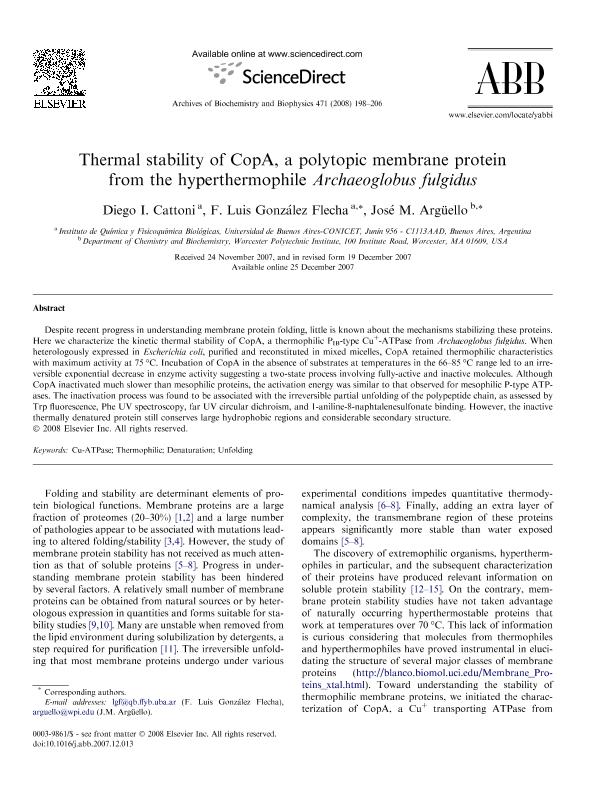Artículo
Thermal stability of CopA, a polytopic membrane protein from the hyperthermophile Archaeoglobus fulgidus
Fecha de publicación:
03/2008
Editorial:
Elsevier Science Inc.
Revista:
Archives of Biochemistry and Biophysics
ISSN:
0003-9861
Idioma:
Inglés
Tipo de recurso:
Artículo publicado
Clasificación temática:
Resumen
Despite recent progress in understanding membrane protein folding, little is known about the mechanisms stabilizing these proteins. Here we characterize the kinetic thermal stability of CopA, a thermophilic P(IB)-type Cu+-ATPase from Archaeoglobus fulgidus. When heterologously expressed in Escherichia coli, purified and reconstituted in mixed micelles, CopA retained thermophilic characteristics with maximum activity at 75 degrees C. Incubation of CopA in the absence of substrates at temperatures in the 66-85 degrees C range led to an irreversible exponential decrease in enzyme activity suggesting a two-state process involving fully-active and inactive molecules. Although CopA inactivated much slower than mesophilic proteins, the activation energy was similar to that observed for mesophilic P-type ATPases. The inactivation process was found to be associated with the irreversible partial unfolding of the polypeptide chain, as assessed by Trp fluorescence, Phe UV spectroscopy, far UV circular dichroism, and 1-aniline-8-naphtalenesulfonate binding. However, the inactive thermally denatured protein still conserves large hydrophobic regions and considerable secondary structure.
Palabras clave:
CU-ATPASE
,
DENATURATION
,
THERMOPHILIC
,
UNFOLDING
Archivos asociados
Licencia
Identificadores
Colecciones
Articulos(IQUIFIB)
Articulos de INST.DE QUIMICA Y FISICO-QUIMICA BIOLOGICAS "PROF. ALEJANDRO C. PALADINI"
Articulos de INST.DE QUIMICA Y FISICO-QUIMICA BIOLOGICAS "PROF. ALEJANDRO C. PALADINI"
Citación
Cattoni, Diego Ignacio; Gonzalez Flecha, Francisco Luis; Argüello, José M.; Thermal stability of CopA, a polytopic membrane protein from the hyperthermophile Archaeoglobus fulgidus; Elsevier Science Inc.; Archives of Biochemistry and Biophysics; 471; 2; 3-2008; 198-206
Compartir
Altmétricas




